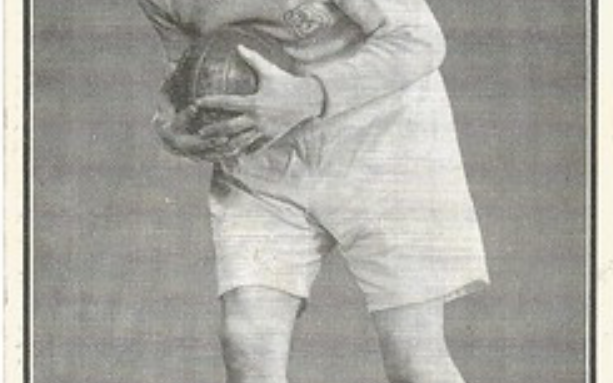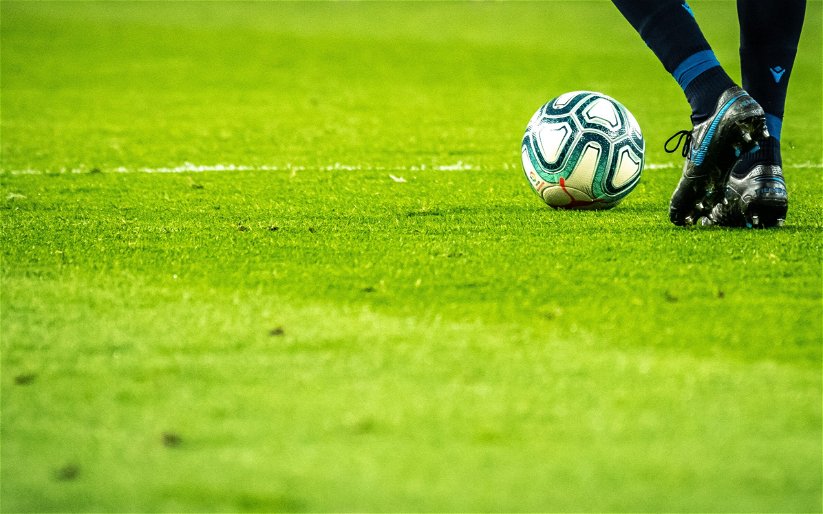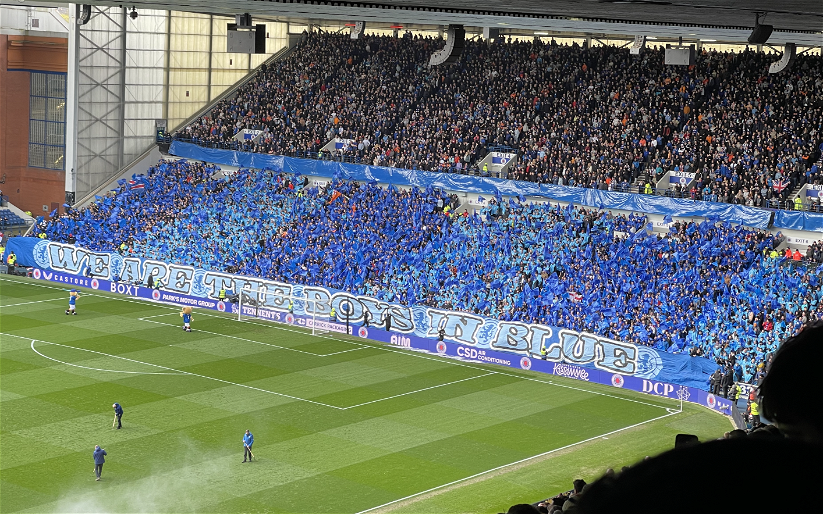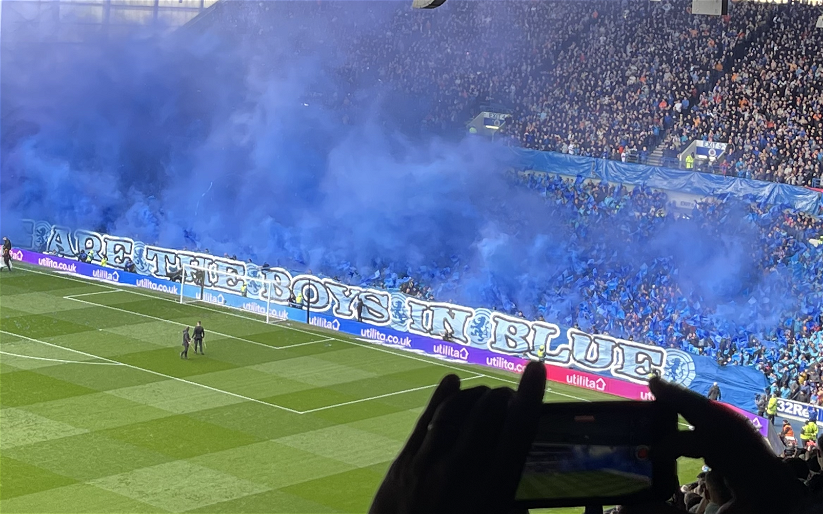By Alistair Aird
According to the excellent ‘Rangers – The Complete Record’, the first recorded Rangers XI was for a match against Star on 19 September 1874. Each of the four founding fathers played in the 0-0 draw, as did Tom Vallance. The goalkeeper that day was one John Yuil, so he can have the distinction of being the first-ever recorded Rangers goalkeeper. (The book also records the names of 10 of the players that played in our first-ever match against Callender in 1872, but it is unclear which of the players kept goal in that match).
Yuil is credited with having played in each of the 15 matches in season 1874/75, and remarkably, he conceded only two goals in those matches. One of them proved costly, though; Dumbarton eliminating Rangers from the Scottish Cup after a replay. Yuil also featured eight times the following season, conceding two goals in the controversial Scottish Cup defeat against Third Lanarkshire Rifle Volunteers.
For the seasons that followed the goalkeeping position was in a state of flux. James Watt played the majority of games in season 1876/77, including the Scottish Cup Final trilogy against Vale of Leven. The following season, David Hill started the first game of the season against Beith in goal but spent the rest of the season as an outfield player.
Hill was one of SIX goalkeepers used in that campaign by Rangers. Watt was one of them, but his Rangers career effectively ended when he conceded five goals against Vale of Leven in a Scottish Cup Fourth Round replay. Rangers had been rampant in the early rounds, knocking in 34 goals in their opening three matches, but came a cropper in a replayed fourth round tie, losing five goals without reply.
Combining playing outfield and in goal was not uncommon in that era. Indeed, one of the founding fathers, Peter Campbell, was one of numerous custodians, playing in goal during a 2-0 defeat against Caledonian in April 1879.
George Gillespie played in goal more than most, though. He initially played as a left back, a position he occupied in Rangers’ first-ever Scottish Cup Final appearance in 1877. He started the following season on the left-hand side of defence too, but when James Watt was absent for the Scottish Cup tie at home to Alexandra Athletic, Gillespie took over in goal. Rangers won 8-0, Peter Campbell and Moses McNeill both scoring hat tricks.
Thereafter, Gillespie emerged as arguably the best Scottish goalkeeper at that time. In the Scottish Cup campaign of 1878/79, Gillespie was the number one. He played in six of the seven ties – all but one as goalkeeper – including the Final against Vale of Leven that ended 1-1.
Rangers refused to replay. Leading 1-0 courtesy of a goal from Willie Sturthers, they looked to have gone further ahead when Struthers headed in a cross from Willie Dunlop. The goal was chalked off, the officials insisting that Struthers was in an offside position. Three minutes from time, Vale of Leven equalised to force a replay. Gillespie seems to have been culpable in the concession of the goal, misjudging the shot from Ferguson thinking it was going wide.
Perhaps in a portent of things to come, the SFA considered a protest from Rangers regarding the legitimacy of their second goal but upheld the result. A date of 26 April was set for the replay, but while the Vale of Leven players turned up at Hampden, Gillespie and his team-mates were enjoying a day at the races! Vale of Leven were awarded the trophy.
George Gillespie was still keeping goal in 1883, although in the intervening period, he had played at right back, left-back, left-half, inside-right and outside-left too. He even notched up some goals, scoring in a 10-0 win over Arbroath in October 1879, netting in an 8-0 win over Caledonian in February 1881 and he was also on the scoresheet when Hibernians were beaten 9-3 towards the end of April 1881.
George was also capped for Scotland. He won the first of seven caps against Wales at the original Hampden Park on 27 March 1880, the same day Rangers were thumping Drumpellier 11-0. He kept goal again when Scotland travelled to London to face England a year later, playing his part in a rousing 6-1 victory. He won two further caps as a Rangers player, matches against Wales in Wrexham and England at Hampden, both of which ended in 5-1 wins for Scotland.
Gillespie played in goal for Rangers for the last time on 24 November 1883. Rangers lost 5-2 at home to Queen’s Park. He moved to Queen’s Park a few months later and was in goal when the Spiders won the Scottish Cup in 1886 and 1890. Less than 10 years later, in February 1900, George passed away, aged 42.
His Rangers record as a goalkeeper reads:

It was a chap called Willie Chalmers who took over from Gillespie in season 1883/84. Chalmers made 26 appearances that season, keeping six clean sheets. One of those was in a 10-0 thrashing of Abercorn in March 1884. Charlie Heggie, who himself had played in goal since he joined the club, scored six goals in that match. Abercorn must have been sick of the sight of the Rangers attackers, less than a fortnight later, they lost 9-2 although the scorers in that game are not known.
Chalmers was the principal custodian for the next three seasons. In the second of those seasons, Willie was beaten 10 times in a 10-2 against Airdrieonians at Kinning Park, Rangers’ worst-ever defeat. There had been heavy snow in Glasgow to such an extent that this match was the only one to go ahead in the city. This was at the behest of the Rangers committee, but the visitors mastered the conditions better and doled out a real hammering.
Chalmers must be one of the most unfortunate Rangers goalkeepers ever. In the 10 games that followed the Airdrie mauling, Chalmers conceded a further 27 goals. Among those games were matches against Bolton Wanderers and Blackburn Rovers. And on 6 November 1886, he conceded five goals in a match against Dumbarton. Rangers recovered from 5-0 down to draw the match 5-5, but they got another hiding on 3 January 1887. They faced Preston North End away from home, and Chalmers was beaten eight times.
But Willie Chalmers does have a place in Rangers’ history. He is one of only seven Rangers players to have been an ever-present in what was the club’s first and to date only appearance in the English FA Cup. Chalmers kept clean sheets against Everton and Lincoln City as Rangers went all the way to the semi-final. However, the journey ended at that point, Chalmers conceding three goals as Rangers lost 3-1 against Aston Villa at Nantwich Road in Crewe.
Willie Chalmers made his last appearance for Rangers on 17 September 1887. He conceded three goals in a 3-2 home defeat against Dumbarton. A month earlier he had lost eight goals as the first Ibrox Park was opened, visitors Preston North End gate-crashing the party by winning 8-1.
His Rangers record reads:

The following season, on 28 May 1888, Rangers faced a team called Celtic in what was the latter’s first-ever fixture. Jimmy Nicol was the goalkeeper, and he conceded five goals in a 5-2 defeat. Thankfully, Rangers would fare much better over the years as the Old Firm rivalry evolved.
A couple of years later the Scottish League was formed. Rangers were one of 10 teams to contest the first-ever title race, and the man trying to keep out the opposition attackers was D.G Reid. Reid played in 16 of the 18 league matches, conceding 25 goals. He kept a clean sheet in five of those games.
Reid also played in the play-off that was ordered after Rangers and Dumbarton ended up tied at the top on 29 points. Although Rangers were 2-0 ahead at half-time, the Sons scored twice after the interval and the first-ever Scottish title was shared.
It’s fair to say that the position of goalkeeper changed hands numerous times in the first 20 years of Rangers’ existence. But that was soon about to change and as the world saw out the last years of the 19th century, Rangers finally found regularity in the last line of their defence.
SAFE HANDS – The First Regular Custodians
D.G Reid was succeeded by David Haddow, who came from Albion Rovers, at the start of season 1891/92. Haddow can probably be recognised as the first regular Rangers goalkeeper. Over the next three seasons, he missed only three league games, and he was in goal when Rangers won the Scottish Cup for the first time in 1894.
Haddow made an inauspicious start to his Rangers career. In his first full season, Rangers finished fifth in the league, 13 points behind a Dumbarton side that had battered them 6-0 in May 1892. Rangers also lost 5-3 to Celtic in the Scottish Cup semi-final. In total, Haddow made 28 appearances, but he shipped 55 goals and only kept the opposition out on five occasions.
However, Haddow, who despite being deemed a bit small to be a goalkeeper was said to have been agile and had excellent judgement, played in some of the most significant games in Rangers’ history. On 2 September 1893 he kept a clean sheet as Rangers recorded their first-ever league win over Celtic, a hat-trick from outside left, John Barker, contributing to a 5-0 win. And later that same season, Haddow was in goal when Rangers beat the same opponent 3-1 to win the much-sought after Scottish Cup for the first time.
Both clubs were enjoying contrasting fortunes prior to the Final which took place on 17 February 1894. Rangers weren’t in the best of form, having lost three of their last five league matches, while Celtic had netted an astonishing 26 goals as they saw off Hurlford, Albion Rovers, St Bernard’s and Third Lanark en-route to the Final. They were also top of the league.
The heavens opened on the day of the game and the rain came down in torrents. According to the match report that made for a ‘spongy’ surface, but that didn’t deter Haddow. Having made a telling contribution in Rangers’ semi-final tie against Queen’s Park -he was noted in the Glasgow Herald as having made a ‘splendid’ save from a corner kick in the first half of a match that ended 1-1 before Rangers edged the replay 3-1 – and he was part of a stoic defence in the first half at Hampden that managed to keep Celtic at bay. Twice in the first half, the Rangers goalkeeper thwarted Celtic, saving shots from Cassidy and Madden, although the match report suggested that there were ‘several times’ that the Rangers goal ‘nearly came to grief.’
Rangers were better after the break, though, and the deadlock was broken 10 minutes after the restart when Hugh McCreadie scored. Haddow’s goal was besieged after that as Celtic sought and equaliser, but it was not forthcoming as Haddow and the likes of Nicol Smith and Jock Drummond stood firm. Indeed, splendid goals from John Barker and John McPherson sealed the match for Rangers, a late consolation from Willie Maley after a ‘scrimmage’ in Haddow’s penalty area being Celtic’s only counter.
David Haddow thus had a place in the Rangers folklore. He joined Nicol Smith, Jock Drummond, Robert Marshall, Andrew McCreadie, Davy Mitchell, James Steel, Hugh McCreadie, John Gray, John McPherson and John Barker in the XI that won the first of 33 Scottish Cups for the club.
Haddow made his last league appearance for Rangers towards the end of the following season in a 2-1 win over St Bernard’s on 27 April 1895. Rangers finished a disappointing third in the league, nine points behind champions, Celtic, and Haddow was also in the team that relinquished the Scottish Cup, Rangers losing 2-1 to Hearts in the opening round.
Haddow won one cap for Scotland, playing in a 2-2 draw against England at Celtic Park in April 1894. After leaving Rangers, he briefly joined Motherwell, making eight league appearances, before moving to England where he turned out for Burnley, New Brighton Tower and Tottenham Hotspur.
Haddow later admitted in a newspaper article that he was a ‘habitual drunkard’ having learned to drink alcohol during a short spell with Derby County. He later admitted that football and the adulation it brought in addition to the drinking and swearing had ‘shattered [his] principles and weakened [his] determination.’ He would later spend eight weeks at a Salvation Army barracks in Whifflet after which he stated that ‘I intend, by the grace of God, to become a Blood-and-Fire Salvationist and an out-and-out Soldier for Jesus Christ.’
David Haddow’s Rangers record reads:

After Haddow departed, the goalkeeper jersey did the rounds in season 1895/96. Six goalkeepers were used in that campaign, and one of the custodians was a gentleman by the name of John Bell. His Rangers career was bookended with games against Hibernian. He made his debut on 26 October 1895 in a 1-1 draw in the league and his time with the club ended after a 3-2 defeat at Ibrox in the Scottish Cup quarter final. The story goes that Bell felt he was culpable for the defeat. At full time, he left the field, got changed in the dressing room without speaking to anyone and walked out the stadium and never returned. The fact that Rangers had missed twice from the penalty spot in the second half suggests that Bell may have been a little hard on himself.
Thankfully, a solution to the goalkeeping challenges facing the club was found with the signing of Matthew Dickie. Dickie came from a club called Renton for whom he had played in the Scottish Cup Final in 1895. Ironically, the match against St Bernard’s which Renton lost 2-1 was played at Ibrox.
Dickie had a connection with Rangers even before he signed for the club. He was born on 19 August 1873 in the same village, Rhu on the east shore of the Gare Loch, as Peter McNeill, one of the club’s founding fathers and gallant pioneers.
The hallmark of the next five seasons after Dickie signed for Rangers was his consistency. Brave and reliable are words that have also been used to describe him. Matthew only missed two league games during those five seasons and over the course of his Rangers career, he was absent for just 17 of the 158 league matches Rangers contested.
Dickie, who picked up four league titles and three Scottish Cups, was also the goalkeeper in the season where Rangers were invincible, winning all 18 of their league matches in season 1898/99. Dickie, one of only five players to play in all 18 games, conceded 18 goals and kept seven clean sheets. He was also an ever-present in the Scottish Cup run, Celtic denying Rangers the double when the won 2-0 at the second Hampden Park in the Final.
The last of Dickie’s three Scottish Cup medals came in 1903. He kept a clean sheet in a 2-0 win over Hearts in the replayed final, the first match having ended 0-0. Remarkably, it would be a quarter of a century before Rangers laid their hands on the trophy again. That would also be the last Scottish Cup tie that Matthew would play for Rangers.
In season 1893/94, Dickie shared goalkeeping duties in the league with John G. Watson, but it was the latter that played in each of the five Scottish Cup ties, including the 3-2 defeat to Celtic in the Final. That match came a couple of months after Dickie’s final league appearance for the club, an 8-1 win over Port Glasgow in the penultimate league match of the seasons on 13 February 1904.
Dickie’s last appearance prior to that had been in an epic match against St Mirren on 9 January 1904. Goals from Alexander Mackie and R. C Hamilton had given Rangers a 2-1 lead at half time, but in the second half, FOUR penalty kicks were awarded. Dickie faced three of them, all of which were converted by David Lindsay. R. C Hamilton scored Rangers’ penalty, but a further goal from Lindsay rendered a late goal from Mackie meaningless, the Saints winning 5-4.
Matthew Dickie, who kept goal in the last match at the first Ibrox Park, a 6-1 win over Kilmarnock on 9 December 1899, was capped three times by Scotland and lived to the grand age of 86, passing away on 30 December 1959.
His Rangers record reads:

When Matthew Dickie left the club, Thomas Sinclair took over for a season or so, but the next regular custodian was an Englishman called Herbert Lock. Willie Newbigging and Harry Rennie had staked a claim, but the recruitment of Lock in 1909 was a landmark moment. It was the first time that Rangers had recruited from an English club, and Lock, who had been the reserve goalkeeper when England beat Scotland 2-0 in April 1909, would hold the fort for the best part of the next 10 years.
Lock made his league debut in a 3-0 home win over Kilmarnock, and as Rangers wrestled back the title from Celtic, he missed only three league matches the former Southampton goalkeeper picked up successive titles in 1910/11 and 1911/12. Admittedly there were some low points – a 5-1 home defeat against Morton and a 5-0 reverse at Easter Road among them – but Lock would have made it three titles in a row in 1912/13 but for an injury that kept him out of action from October until the end of the season.
Lock came back for the following season, playing in 12 of the last 13 league games, but he was now vying with John Hempsey for the goalkeeper’s jersey. Lock was the main man, however, when Rangers won the title in season 1919/20, keeping 20 clean sheets in 35 league appearances.
Herbert Lock made his last league appearance for Rangers on 10 April 1920, three days after he had conceded two goals in the defeat against Albion Rovers in the Scottish Cup semi-final replay. His final match was a 0-0 draw against Hearts at Tynecastle.
His Rangers record reads:

Stability and consistency were now what was standing out when it came to the position of goalkeeper at Rangers. And that trend continued between the two World Wars, with the next custodian stringing together almost 250 successive league and Scottish Cup ties for the club.
Safe Hands – The Inter-War Years
Three days after Herbert Lock made his last appearance for Rangers in the goalless draw against Hearts, Willie Robb made his debut in a 2-1 win over Ayr United. Remarkably, he would play in each, and every league and Scottish Cup match Rangers contested from then until 31 October 1925. That amounts to 217 consecutive league games and 24 Scottish Cup ties.
Robb had good reason for missing the Rangers game on 31 October, though. Despite there being a full league card in Division One – Rangers were in Kirkcaldy to face Raith Rovers – Scotland were facing Wales in a British Championship match at Ninian Park in Cardiff. Robb was selected and won the first of two caps for his country, keeping a clean sheet in a 3-0 win. His second cap also came against Wales two years later.
Robb was the last line of defence in an impressive side. The regular full backs were Bert Manderson and Billy McCandless, the half-back line was Davie Meiklejohn, Arthur Dixon and Tommy Muirhead, while the front five was more often than not Sandy Archibald, Andy Cunningham, Geordie Henderson, Tommy Cairns and Alan Morton.
They were formidable going forward, but tight at the back too. In his first full season, Robb conceded just 24 goals in 42 league matches. The opposition drew a blank in 22 of those fixtures. Rangers lost only one league game – a 2-0 defeat to Celtic on New Year’s Day at Ibrox – and scored 91 goals to give Robb the first of four league titles he picked up in his Rangers career. Those titles were also the first four of the remarkable Bill Struth era.
Aside from his remarkable consistency, Robb had all the necessary attributes to be a great goalkeeper. He was agile, had good reflexes, and his distribution was very good too. For a tall man, accounts of the time say that didn’t prevent him from getting down to low shots quickly, and he wasn’t averse to coming off his line to thwart attackers. And he also had something that all Rangers goalkeepers need, razor sharp concentration. With that side always on the front foot, Robb would be inactive for spells in each game, but he received praise for staying focussed in a number of games.
The one downside of Robb’s spell at Rangers was the lack of silverware in the Scottish Cup. Rangers hadn’t won the Cup since 1903, but they did reach the final in Robb’s first two full seasons at Ibrox. They lost both matches, though, against Partick Thistle and Morton. Defeats against Ayr United and Hibernian followed before the nadir of Robb’s Rangers career was hit in 1925.
Rangers faced Celtic in the Scottish Cup semi-final at Hampden. But they didn’t go into the match in the best of form having won just one of their previous seven league matches. And they capitulated in this one watched by a crowd of 101, 714, the first time a six-figure attendance had been recorded at a club fixture in Scotland.
It’s unclear from the press accounts of the time if Robb was culpable for any of the goals – the summary of the match in the Glasgow Herald amounted to a single paragraph – but even if he was, he was still Struth’s number one. In the remaining seven league matches after the semi-final, Robb conceded only three goals and kept five clean sheets.
International commitments aside, it looked like Willie Robb was likely to extend his run of games for Rangers in season 1925/26. However, he picked up an injury in a 3-1 win at Fir Park towards the end of November 1925, and although he came back for a run of seven straight league games, he pulled on the goalkeeper’s jersey for the last time as a Rangers player in a 2-2 draw against Hearts at Ibrox on 16 January 1926. The Edinburgh side were chasing the championship and led 2-0 at one stage of the game. Reports of the time point the finger of blame for both goals at Willie Robb. It was a sad way to end what had been a wonderful Rangers career.
Willie Robb’s Rangers record reads:
![]()
The man tasked with taking over goalkeeping duties from Willie Robb was Tom Hamilton. He deputised for Willie Robb in that Halloween match against Raith, and from the latter part of that season until 1931/32, Hamilton showed similar consistency of selection like his predecessor had. He missed a mere seven league matches in that time as Rangers romped to five league titles on the trot. And he was also instrumental in ending a hoodoo that had lasted for quarter of a century.
In that era, the Scottish Cup carried with it more prestige than the league title, and by the start of season 1927/28 it had been 25 years since Rangers had claimed the trophy. Wins over East Stirling, Cowdenbeath, King’s Park, Albion Rovers and a Hibernian side featuring one Willie Robb took Rangers through to another final. The stage was set.
A record attendance of 118,115 watched on as Celtic enjoyed the best of the opening half. And it took a superb save from Hamilton to keep the scoresheet blank at the interval. Paddy Connelly unleashed a goalbound effort, but he was denied by the magnificent Hamilton. The rest, as they say, is history. Rangers scored four times without reply after the break and a ghost was exorcised.
Hamilton only missed one match over the course of the next three seasons, a 1-1 draw against St Mirren in January 1931. And although he only made 25 league appearances in season 1931/32, he was front and centre when Rangers defeated Kilmarnock 3-0 in a replayed Scottish Cup Final.
That added to the medal Hamilton had collected in season 1929/30, but the emergence of Jerry Dawson effectively spelled the end of Tom’s Rangers career. But he was to enjoy a swansong. On 21 April 1934, Rangers faced St Mirren in the Scottish Cup Final. Dawson had played in all the ties leading up to the Final, but he had picked up an injury so Mr Struth called upon his trusted understudy. Hamilton kept a clean sheet and picked up his fourth Scottish Cup winners’ medal, goals from Nicholson (2), McPhail, Main and Smith giving Rangers a comprehensive 5-0 win.
Tom Hamilton’s Rangers record reads:

And thereafter came the ‘Prince of Goalkeepers’, James ‘Jerry’ Dawson. Nicknamed Jerry after the former Burnley goalkeeper, Jerimiah Dawson, Jerry came to Rangers in 1929 but had to wait until January 1931 to make his league debut. But in the seasons that followed, he established himself as the undisputed number one.
In season 1933/34 when Rangers won the league and Scottish Cup, Dawson was in goal for 36 of the 45 matches played in the league and Scottish Cup. He conceded only 31 goals in those matches, keeping clean sheets in 14 of them.
Until the outbreak of World War II, Dawson rarely missed a game. After missing the Cup Final in 1934, he only failed to appear in 20 league or Scottish Cup matches. His deputy, George Jenkins, stepped in when required, but Jerry was the main man.
Dawson’s exemplary reflexes set him apart from his peers and he also had authority in the penalty area. However, like many others, his career was badly compromised by the outbreak of war in 1939, although he still served the club with distinction during the conflict. He made 169 appearances in wartime competition, keeping 66 clean sheets.
It was during the war years that Dawson sustained a nasty injury in the Southern League Cup Final against Hibernian. After 17 minutes, he collided with the Hibs inside right, Tommy Bogan, and was carried off on a stretcher. It was later established that Dawson had broken his leg. A certain James Scotland Symon took over in goal for the remainder of the match. Hibernian claimed the trophy, winning 6-5 on corner kicks after the match ended 0-0.
A leg break was a serious injury at the time, and it effectively ended Jerry Dawson’s Rangers career. He made his comeback in a Southern League match against Partick Thistle at Firhill almost a year later on 2 April 1945, but only played a further nine league games for the club. His final league appearance was in a 2-1 win over Motherwell at Fir Park, and four days later he played at Ibrox for the last time in the infamous 2-2 draw against Moscow Dynamo in November 1945.
Jerry Dawson played for Rangers for the last time on 15 April 1946. The venue was Petershill Park, and the opposition was Celtic. The match was arranged to raise funds for the George Henry Memorial Fund, Rangers winning 2-1 thanks to goals from Billy Arnison and Murdoch McCormack. The latter sadly passed away at the age of 30 in 1951. He made 21 appearances for Rangers during the war, scoring 13 goals. One of them was against Celtic on 1 January 1944, the second goal in a 3-1 win at Parkhead in the Southern League.
Jerry Dawson is among the most decorated goalkeepers in Rangers’ history. He played a part in five league title triumphs, three Scottish Cups, one Scottish Regional League Western Division title, one Scottish Emergency War Cup, four Southern League titles, and three Southern League Cups. He was also capped 14 times for Scotland, winning his first cap against Northern Ireland in a 2-1 defeat at Windsor Park in Belfast in October 1934. Dawson also played in nine wartime international matches.
Dawson joined Falkirk after he left Rangers, and while there, he played an instrumental role in helping his former club win their first-ever Treble in 1948/49. On the final day of the league season, Rangers were away from home against Albion Rovers, while league leaders Dundee faced Falkirk at Brockville. Dundee only needed a point to be champions. But Dawson saved a penalty at a vital stage of the game, Dundee lost 4-1, and Rangers won by the same scoreline in Coatbridge.
Jerry Dawson’s Rangers record reads:
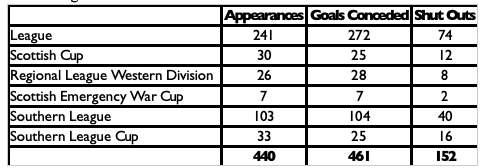
Footnote: The author of the article appreciates that these goalkeepers played in other matches for Rangers, notably in the Glasgow Cup and Glasgow Merchant’s Charity Cup. While this analysis hasn’t accounted for the respective records in these games to allow comparison with the modern-day goalkeepers, it is noted that these competitions were important, particularly up to the early 1960’s.

